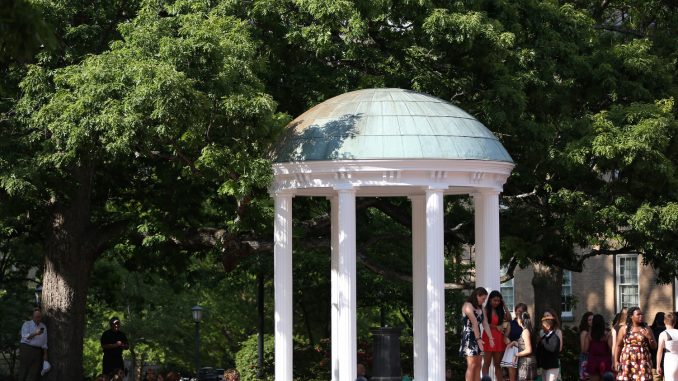
It is no secret college administrators and faculty tend to lean left, taking their college campuses with them. They fight for big government sectioned off into bureaucracies to be run by themselves, the so-called “experts.” This idea was largely initiated by Woodrow Wilson. Wilson strongly believed public policy should be set by academic experts because, unlike the populace, they were specifically educated in their fields. This concept still creeps around college campuses today, where students take their professors’ lectures as unquestioned truth. According to a recent study, 60 percent of professors identify as liberals, while a mere 12 percent identify as conservative.North Carolina public colleges are no different. They reflect what we see throughout the country, an uneven ratio of Democratic and Republican professors. According to The College Fix, “professors registered as Democrats outnumber those registered as Republicans by a ratio of roughly 12 to 1 at the University of North Carolina Chapel Hill.” Professors who identify as Democrats saturate the humanities departments, again a trend we see throughout the country. However, does uneven professorship need to be corrected?Earlier this year, state Sen. Ralph Hise, R-Mitchcell, introduced an amendment which would require “ideological balance in faculty hiring” within North Carolina’s universities. This would entail party affiliation to be taken into consideration upon the hiring of a professor. In many ways, it would institute affirmative action for college professorships within the state. While college campuses have become the sounding board for “diversity” through policies like affirmative action, one can only imagine the response if the same standard was applied to university professorship. At the end of the day, it is external diversity and internal conformity colleges seek. While Hise’s amendment was not intended to pass, but rather to make a statement, other states such as Iowa have considered similar legislation. Another rising solution to this perceived problem is a “free-market” approach developing among students. Through social media networks, students are able to help other students dodge classes taught by politically progressive professors who are unfriendly to conservatives.The initial reaction to the lack of diversity among college professors may be a concern for Republican or conservative students. However, it is not Republican students who are shorthanded in their education experience, but rather the students who occupy the left side of the political spectrum.The college experience, in the classroom at least, is different depending on where the student falls on the political spectrum. Conservative students may feel as though they are in an uphill battle, while liberal students do not recognize the echo chamber surrounding them. Their minds are set to autopilot as they already agree with the principles underlining what they are being taught and are therefore, not exposed to the same level of critical thinking as their conservative counterparts. If liberal students already know and agree with what the professor is teaching, there is no need to question or challenge their professor, the “expert.” Further, there is no motivation for introspection and the questioning of one’s own beliefs. Progressive students leave college reaffirmed, rather than challenged; shutting down others’ views, rather than developing the skills to discuss and debate.I earned my degree in political science from the University of North Carolina at Chapel Hill, and my college experience was nothing close to unbiased. Most of what I was being taught conflicted with my conservative principles of individual liberty, limited government, and the rule of law. I knew what I believed and despite the constant indoctrination from my professors, my political ideology did not shift toward the left, but in fact was strengthened. Challenges to my ideology and worldview in college was beneficial. I always found class discussions interesting, stimulating, and an opportunity to learn something new about views which were not my own. I was exposed to the shortcomings of my own argument and learned how to address those shortcomings for future discussions. In preparation for class discussions, I would typically do my own research and readings not assigned by my professor. I wanted to make sure I had enough facts to make a sound argument. Instead of avoiding dialogue or whining about my “unfair” professors, I learned how to have political, religious, and philosophical discussions in an environment unfriendly to my worldview.This is the purpose of college, to challenge students and encourage them to question everything.Aimee Mulligan is the executive producer at Red Wolf Broadcasting in Raleigh.



